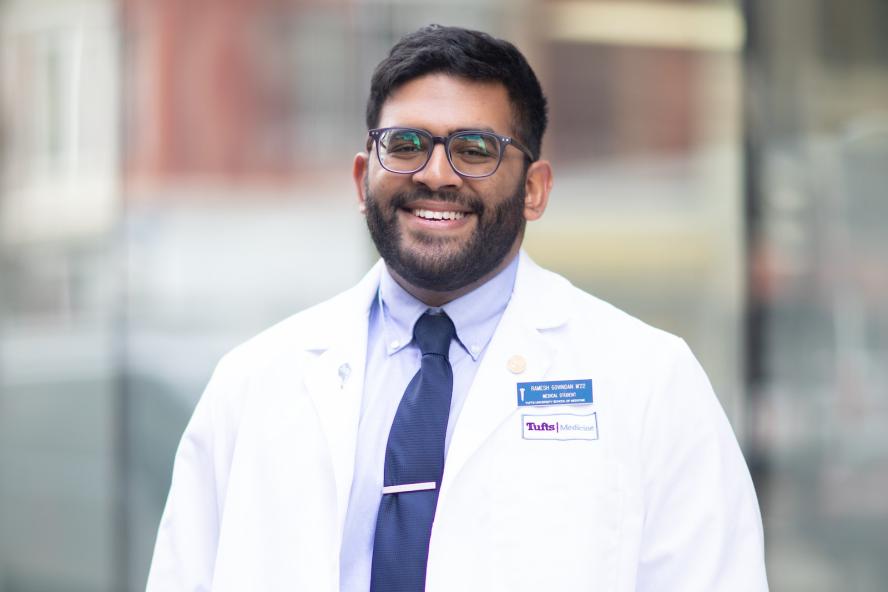-
About
- Departments & Offices
-
Academics
- Public Health
- Biomedical Sciences
- Physician Assistant
- Special Master’s (MBS)
-
Admissions & Financial Aid
- Tuition & Fees
-
Student Experience
-
- Student Resources by Program
- Academic & Student Support
- Wellness & Wellbeing
- Student Life
- Events & Traditions
-
-
Research
- Research Labs & Centers
- Tufts University-Tufts Medicine Research Enterprise
-
Local & Global Engagement
- Pathway & Enrichment Programs
- Global Health Programs
- Community Engagement
Ramesh Govindan, M22, GSBS22
Degree: MD/PhD in Cell, Molecular, and Developmental Biology

What was it like studying virology during a global pandemic?
It made everything real. I finished my lab work just before everything shut down, and I remember that at my Ph.D. defense everyone was asking questions about COVID-19, even though I was presenting on Ebola. It was rewarding in the sense that some of the lessons from my work on the spike proteins of Ebola and influenza could translate to SARS-CoV-2; I think a thin silver lining of this pandemic is that more resources will be devoted to virology research on an international level.
My Ph.D. centered on understanding how viral spike proteins function and how antibodies bind them, in order to inform vaccine design. Today, with the emergence of COVID-19 variants like omicron, understanding how spike proteins evade immunization is more important than ever.
What’s your superpower?
Patience, I suppose. An ability to delay gratification. If I couldn’t do that, I wouldn’t be in this program. I did four years of college, eight years in the MD/Ph.D. program here at Tufts, and I have three more years of residency to go, with a fellowship likely after that. It’s a long road.
I’ve taken that into my hobbies too. I’ve recently gotten into bonsai—you spend years growing something that you can enjoy when you’re old, kind of like my degrees. I’ve also gotten really into cooking. I like finding creative outlets where you can be proud of something that isn’t a grade or a lab result.
What most surprised you about yourself during your time here?
On the wards, I’ve realized I’m far more of an emotional person than I thought. I always used to see myself as a scientist first and all about cold logic, and the human element of medicine can be very challenging. If you’re meeting a patient in the hospital, they’re probably having the worst day of their life. You have to immediately get on their level and be there for them as a human being.
Even harder for me was pulling myself out of that mindset when I came home from the hospital. I find that talking about those experiences helps a lot—how to move forward without holding on to frustration and guilt. That’s been my biggest growing experience in the last eight years; this drive to become an empathetic caregiver who cares deeply but isn’t overwhelmed or destroyed by it.